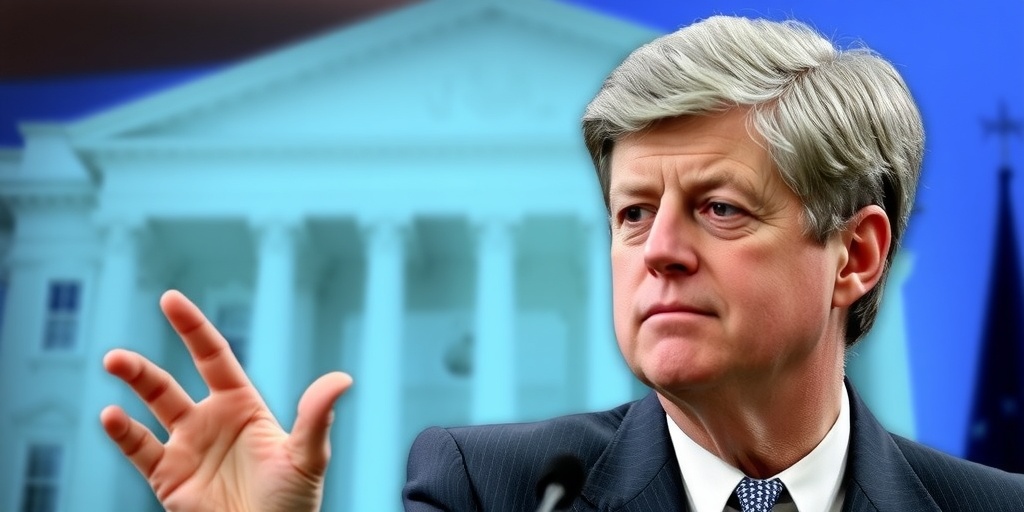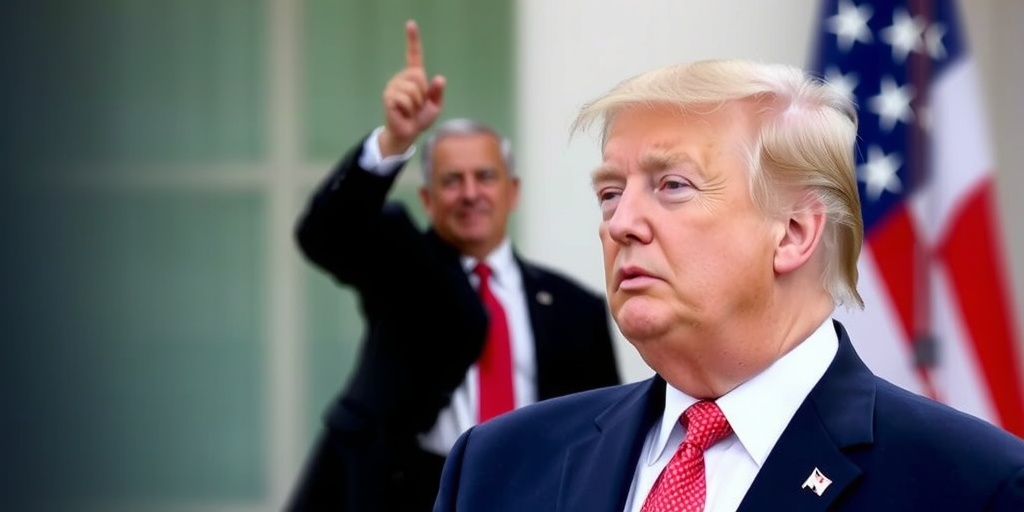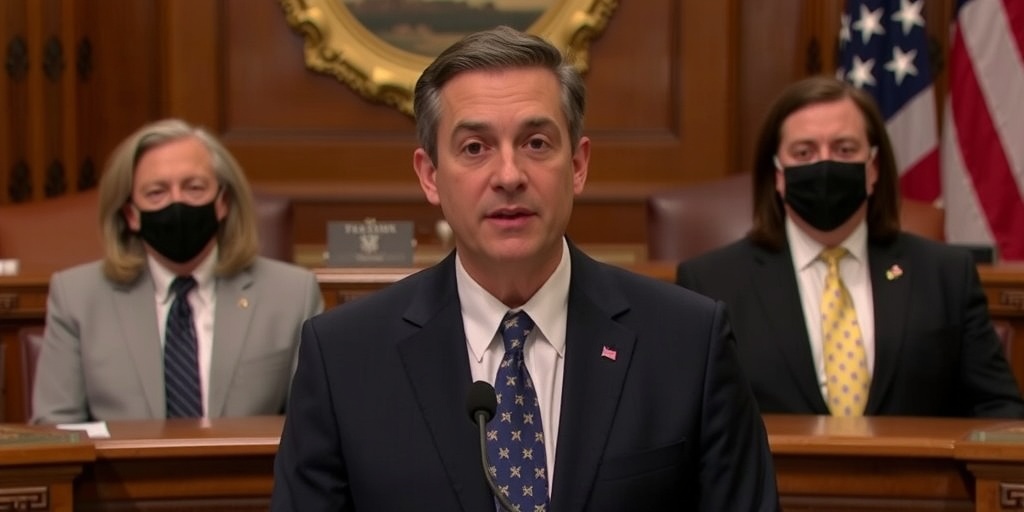Now Reading: Kennedy Claims FDA Influence from Drug Industry Blocked Alternative Remedies
-
01
Kennedy Claims FDA Influence from Drug Industry Blocked Alternative Remedies
Kennedy Claims FDA Influence from Drug Industry Blocked Alternative Remedies

In a recent address delivered at the Food and Drug Administration (FDA) campus in Maryland, newly appointed Health Secretary Robert F. Kennedy Jr. painted a provocative picture of the agency’s current state while outlining his vision for its future. Kennedy’s speech ranged from environmental issues to broader critiques of the FDA’s relationships with the pharmaceutical industry, marking a significant moment in his tenure as he oversees substantial changes within the Health and Human Services Department.
During his address, Kennedy acknowledged that the FDA was in the midst of significant turmoil, with a loss of 20% of its workforce attributed to voluntary departures, layoffs, and funding cutbacks. He called on agency employees to resist the inclination to protect large corporations at the expense of public health, a sentiment that has resonated with critics who argue that the FDA has been too lenient towards industry interests.
Highlighting a pressing concern, Kennedy indicated that the staff reductions have adversely impacted essential services provided by the FDA, including those ensuring food safety, drug approvals, and the oversight of substances like tobacco. He noted, “We want to break away from this so we can make our kids healthy,” urging staff to prioritize public well-being over corporate influence. His comments reflect a broader narrative that has echoed in public discourse regarding the relationship between regulatory bodies and the industries they oversee.
Kennedy explicitly chastised the FDA for not approving certain “alternative medicines,” such as raw milk and stem cell treatments, alleging the agency’s decisions are unduly influenced by wealthy corporate interests. Advocates for traditional medicine have contended that many alternative treatments do not meet fundamental safety and efficacy standards. Kennedy’s emphasis on countering corporate power and advocating for public health reforms drew a direct link to his criticisms of the so-called “deep state,” a term many use to describe entrenched interests within the federal bureaucracy.
Adding to the tension, Kennedy characterized the FDA as a “sock puppet” for the very industries it is meant to regulate, suggesting that current practices disproportionately benefit powerful incumbents within the pharmaceutical sector. He urged FDA employees to speak out against perceived misconduct, saying, “If your boss is making a mistake, if they’re approving something that shouldn’t be approved, we want to hear.” This call to action positioned Kennedy as a figure willing to challenge the status quo, something drug makers have viewed with a mixture of anxiety and apprehension.
The FDA has faced criticism over recent approvals of controversial drugs, leading to questions about the efficacy of its oversight. In past years, FDA officials have been known to override scientific and advisory consensus on critical products, raising alarms about the agency’s commitment to patient safety. Kennedy’s remarks signal a shift in how he intends to address the ongoing criticisms of the FDA, focusing on its need to re-establish integrity and independence in its regulatory practices.
Notably, during the address, Kennedy expressed concern over current regulations that permit food companies to self-certify the safety of new ingredients. This immense regulatory loophole means that thousands of ingredients can enter the food supply with minimal oversight, which Kennedy argues contributes to surging rates of diabetes and other health issues in the U.S. He questioned the wisdom of allowing corporations to label ingredients as “generally recognized as safe,” a practice that fundamentally undermines the integrity of food safety regulations.
Kennedy’s vision extends beyond mere rhetoric; he envisions a transformative approach that prioritizes public health over corporate profit. He echoed sentiments he had expressed in a previous social media post, accusing the FDA of conducting a “war on public health” by suppressing innovative but unproven treatments. In his view, the agency’s actions have not only endangered consumers’ health but also stifled advancements in healthcare that cannot be monetized by large pharmaceutical companies.
The fallout from Kennedy’s overhaul is palpable; numerous experienced staff members have left the FDA, certain cuts may jeopardize crucial regulatory processes, and industry leaders have voiced concerns about the potential slowdown of drug reviews and trials. A public letter from biotech executives articulated their worries regarding the state of the FDA and the loss of skilled personnel, highlighting that some have already encountered regulatory challenges that they attribute to these staff shortages.
As Robert F. Kennedy Jr. continues to navigate his new role, his speech underscores a significant pivot in the FDA’s trajectory, raising essential questions about the balance between corporate interests and public health. With profound implications for the future of drug approval processes and food safety regulations, Kennedy’s administration promises to draw both enthusiastic supporters and stern critics as it seeks to redefine the FDA’s mission.
Stay Informed With the Latest & Most Important News
Previous Post
Next Post
-
 01New technology breakthrough has everyone talking right now
01New technology breakthrough has everyone talking right now -
 02Unbelievable life hack everyone needs to try today
02Unbelievable life hack everyone needs to try today -
 03Fascinating discovery found buried deep beneath the ocean
03Fascinating discovery found buried deep beneath the ocean -
 04Man invents genius device that solves everyday problems
04Man invents genius device that solves everyday problems -
 05Shocking discovery that changes what we know forever
05Shocking discovery that changes what we know forever -
 06Internet goes wild over celebrity’s unexpected fashion choice
06Internet goes wild over celebrity’s unexpected fashion choice -
 07Rare animal sighting stuns scientists and wildlife lovers
07Rare animal sighting stuns scientists and wildlife lovers





















